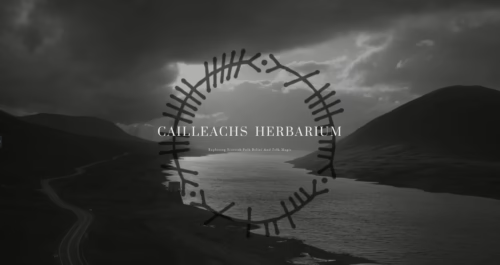The Taibhsear Collective came together in 2018 to make Tales of the Taibhsear, an album of stories and songs based on Scottish witch trial records and the 18th century collecting work of James MacKenzie. The Collective was formed of musician Debbie Armour of Burd Ellen, storyteller Amanda Edmiston of Botanica Fabula, and author and researcher Scott Richardson-Read of The Cailleach’s Herbarium, who are all passionate about Scottish folk magic and community traditions. When their Kickstarter campaign for Tales of the Taibhsear raised more than three times its target, the extra funds were used to organise their first event exploring magic and traditions, Dreaming Bread and Skyrie Stanes, at the Scottish Storytelling Centre in 2018. The Kickstarter money and donations raised at the event were also used to found The Woven Land Network, a charity which aims to protect and conserve Scottish heritage sites.
Now with two sold out events under their belt and a new member in folklorist and writer Amelia Starling, The Taibhsear Collective are working to grow a supportive and inclusive community encompassing interest in and practise of Scottish folk traditions, within Scotland and beyond.
What is a Taibhsear?
The title Taibhsear (pronounced tive’sher) is given to people who have dà-shealladah, the second sight, which enables them to see spirits. It literally translates as ‘ghost seer.’ Taibhsear is not something you would call yourself, but a title earned within the community. Taibhsears could see the worlds of both the dead and the living. With this came visions, such as premonitions of people who would soon die. Interpreting these visions and managing the ability to see them required great skill in order to avoid becoming taibhsearan (spectre haunted).
Meet the Taibhsear Collective
Amanda Edmiston
Amanda is a professional storyteller and creative practitioner with a background in herbal medicine. Based in Scotland, she works across the UK and internationally. Clients include The Royal College of Physicians and Surgeons in Glasgow, Chelsea Physic Garden, The Scottish Ballet, and The Ashmolean Museum. Collaborative projects have included a story and sculpture trail (with Rob Mulholland) and Grow 73, as well as creating workshops for schools with Dr Anna Groundwater and James Loxley of Edinburgh University’s Travellers’ Tales and Tales for Travellers.
Amanda’s project The Kist in Thyme resulted in a touring exhibition and workshops featured at The National Museum of Scotland Rural Life, The Scottish Storytelling Centre, and the MacRobert Arts Centre. She is currently working on The Very Curious Herbal, a multi-dimensional project inspired by the work of Elizabeth Blackwell.
As part of the Taibhsear Collective, Amanda writes and retells stories of Scotland’s community traditions and curates storytelling within the events, pairing storytellers with academics to reveal the ideas in practice with the intention of increasing awareness of and accessibility to storytelling.
Scott Richardson-Read
As a researcher and writer, Scott explores Scottish folk magic traditions on his prolific website The Cailleach’s Herbarium. He is the current co-ordinator of The Woven Land Network, a charity dedicated to protecting Scottish heritage sites. The Woven Land Network was created as a result of the Taibhsear Collective’s first project, Tales of the Taibhsear, and its supporting event Dreaming Bread & Skyrie Stanes.
Scott also holds Masters degrees in Psychology, Social Work, and another in Research, and works to care for and support marginalised people across Scotland through the lens of community building.
Amelia Starling
Amelia Starling is a writer and folklorist. She studied B. A. (Hons) Creative Writing at the University of Winchester, and writes stories, poetry, and creative non-fiction relating to folklore and fairy tales. After completing her studies, she used storytelling and creative writing to teach English to children and adults whilst living abroad in Japan and Italy. Amelia is also an editor for the online journal Folklore Thursday, and has delivered folklore seminars and workshops at the University of Essex’s Centre for Myth Studies, and the Scottish Storytelling Centre as part of the Taibhsear Collective’s events. She is currently completing a masters’ degree at the University of Aberdeen, and working on building her portfolio of writing and performance storytelling. You can read her work on her website The Willow Web.
Former Members
Debbie Armour
Debbie Armour is a Glasgow-based musician, working primarily with traditional song. Broadly, her work is motivated by ideas of persistence, resonance, and deep cultural roots. In her current solo project, Burd Ellen, she uses British and international traditional song to explore women’s narratives. She is also a member of critically acclaimed contemporary folk a capella group Green Ribbons. In addition to her performance work, Debbie develops and delivers a variety of community projects. She uses archive material to look at ideas of community and shared cross-cultural heritage. She is also an experienced song leader and group facilitator.
Debbie’s work with the Taibhsear Collective joins all the threads of her practice, reseeding curiosity and fostering community through the delivery of high quality events, performances, and recorded music that explore Scottish folk magic traditions. Debbie has performed live in session on BBC Radio 3 and BBC Radio Scotland, at the Edinburgh International Festival, Celtic Connections, Cafe OTO, and ALICE Copenhagen, amongst many other appearances. She tours regularly in the UK and Europe.
Our value and Ethics
Established in 2017, the Taibhsear Collective is concerned with the promotion, conservation, celebration and advocacy of Scottish folk traditions, customs, and practices.
We are a not-for-profit collective. We ensure equitable pay for everyone involved in the work we do.
We think of Scottish folk traditions, creative arts, and academia as being in a relationship with the common – that is, in the realm of community and the people who live this culture. We see our role in this relationship as exploring and showing the ways in which Scottish folk traditions bring diverse communities together to celebrate, conserve, and experiment with the ever-unfolding connections. It’s through this confluence that we are able to find new ways of expression and provide a platform for these conversations and experimentations to take place.
Scottish folk traditions are diverse as the people who experience them. When we speak of folk traditions we mean, song, dance, art, storytelling, history, oral culture, customs, and the various life ways and languages that stem from and birth them.
Scottish folk traditions impact on the way we move and interact with space, our identity as Scottish, and Scottishness in a more global sense. They give us a voice to be heard through and to retell periods of history and localised culture to wider audiences and allow us to collectively speak power to community. They also offer points of challenge as cultures change. How new thinking intersects with older ways is a vital and ongoing conversation that we aim to be an actively listening and contributing part of.
For these reasons, the Taibhsear Collective operates in a way that welcomes difference and celebrates diversity. This informs our values and ethics as an organisation. Scotland’s culture is a melting pot of influences and convergencies. In celebration and protection of these values, the Taibhsear Collective will not tolerate any demonstration of or alignment with: racism, ableism, homophobia, transphobia, aporophobia, gender discrimination, classism, or elitism. We will not engage with or hire any organisation, contractor, or individual not ascribing to these values. The physical spaces that we use must be accessible to all.
Our values and ethics are further informed by the permaculture ethics of earth care, people care and fair share and care organisation ethics.
We challenge oppression where we find it and support organisations who champion minority voices. We are led in our actions by those who experience the oppression. Our values and ethics are constantly evolving. We welcome challenges to our thinking, approach and delivery.

